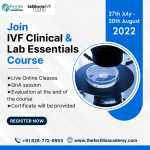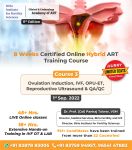
IVF NewsAnnouncement: 𝙏𝙤𝙥𝙞𝙘: Ovulation Induction in ART
Dr. Prof (Col) Pankaj Talwar VSM 16 July 2022

Join Special Curtain Raiser Class 27 𝙏𝙤𝙥𝙞𝙘: Ovulation Induction in ART 𝘿𝙖𝙩𝙚: Friday 22nd July. 2022 𝙏𝙞𝙢𝙚: 𝙨𝙝𝙖𝙧𝙥 8:00 PM - 9:00 PM (IST) 𝙎𝙚𝙚 𝙮𝙤𝙪 𝘼𝙡𝙡 𝙤𝙣 Friday! 😊🙏🏻 𝙁𝙤𝙧 𝙢𝙤𝙧𝙚 𝙞𝙣𝙛𝙤 𝙤𝙧 𝙩𝙤 𝙗𝙚 𝙩𝙝𝙚 𝙥𝙖𝙧𝙩 𝙤𝙛 𝙎𝙥𝙚𝙘𝙞𝙖𝙡 𝙒𝙝𝙖𝙩𝙨𝙖𝙥𝙥 𝙂𝙧𝙤𝙪𝙥:-𝙒𝙝𝙖𝙩𝙨𝘼𝙥𝙥 'ART' 𝙤𝙣 https://wa.me/918287883005 Team i-Ceat😊🙏🏻 i-ceat.com
#embryology #embryotransfer #artcoursesonline #ivfcourses #onlinetraining #ivf #embryologycourse #healthcarecareers #embryologycourses #ARTCourses #reproductivetechnology [ Full Article ] News: IVF Clinical and Lab Essentials: A Comprehensive Course
Dr. Sarabpreet Singh 15 July 2022

The Fertilis Academy in association with Sadbhavna IVF School is offering "IVF Clinical and Lab Essentials: A Comprehensive Course". [ Full Article ] Announcement: Course 03- Ovulation Induction, IVF, OPU-ET, Reproductive Ultrasound, and QA/QC
Dr. Prof (Col) Pankaj Talwar VSM 15 July 2022

𝙍𝙚𝙜𝙞𝙨𝙩𝙧𝙖𝙩𝙞𝙤𝙣 𝙊𝙥𝙚𝙣 𝙛𝙤𝙧 𝙎𝙚𝙥. 2022 𝙗𝙖𝙩𝙘𝙝!! 𝙎𝙚𝙖𝙩𝙨 𝙖𝙫𝙖𝙞𝙡𝙖𝙗𝙡𝙚 𝙤𝙣 𝙛𝙞𝙧𝙨𝙩 𝙘𝙪𝙢 𝙛𝙞𝙧𝙨𝙩 𝙨𝙚𝙧𝙫𝙚 𝙗𝙖𝙨𝙞𝙨. 𝙍𝙚𝙜𝙞𝙨𝙩𝙚𝙧 𝙏𝙤𝙙𝙖𝙮! Course 03- Ovulation Induction, IVF, OPU-ET, Reproductive Ultrasound, and QA/QC Course Highlights:- 45+ 𝙝𝙧𝙨 𝙊𝙣𝙡𝙞𝙣𝙚 LIVE Classes + Recorded Video Links. Extensive Reading Material. Certification at the end of the Course. 18+ 𝙝𝙧𝙨 𝙀𝙭𝙩𝙚𝙣𝙨𝙞𝙫𝙚 𝙃𝙖𝙣𝙙𝙨 𝙊𝙣 𝙏𝙧𝙖𝙞𝙣𝙞𝙣𝙜 𝙞𝙣 𝙄𝙑𝙁 𝙇𝘼𝘽 & 𝙊𝙏 Complete Hand Holding 𝙁𝙤𝙧 𝙢𝙤𝙧𝙚 𝙞𝙣𝙛𝙤, 𝙥𝙡𝙨 𝙛𝙚𝙚𝙡 𝙛𝙧𝙚𝙚 𝙩𝙤 𝙘𝙖𝙡𝙡 𝙊𝙧 𝙙𝙧𝙤𝙥 𝙖 𝙒𝙝𝙖𝙩𝙨𝘼𝙥𝙥 𝙤𝙣 :- https://wa.me/918287883005 Team i-Ceat #embryology #embryotransfer #artcoursesonline #ivfcourses #onlinetraining #ivf #embryologycourse #healthcarecareers #embryologycourses #ARTCourses #reproductivetechnology [ Full Article ] Webinar: PRISON AND ASSISTED REPRODUCTION
International IVF Initiative 14 July 2022

19th July, 2022, 3pm EST/ 8pm UK/ 9pm CET MORE TO COME ON CIVIL RIGHTS SOON! [ Full Article ] News: Commercial DNA testing used to gain donor conception information
Alex Kastelein 14 July 2022
With consumer DNA testing growing in popularity, it is becoming increasingly difficult to ensure the anonymity of both donors and donor-conceived children. According to the ongoing Connecte DNA study, there have been more people using consumer genetic testing to reveal information about genetic relatives. With large commercial DNA databanks, the parties involved in donation and conception can now bypass the regulated channels of receiving donor information. Dr Lucy Frith, reader in bioethics at the University of Manchester, presented the findings at the annual meeting of the European Society of Human Reproduction and Embryology (ESHRE). According to Dr Frith, 'donor-conceived people can use these services to conduct a DNA test to search for their genetic parent; recipient parents can test the child to identify the donor and any other half-siblings; and donors themselves can also take a DNA test to search for the offspring of their donations.' She added: 'the donor (or the donor-conceived child) need not be in a database to be identified – as a close genetic relative may be in the database and thereby traceable.' Researchers involved in the ConnecteDNA study conducted interviews with sperm, egg and embryo donors, parents through donor conception, and donor-conceived adults. Interim results suggest that commercial DNA testing services, and social media, are being used to find genetic relatives as well as, or instead of, 'official' routes. In the UK, information about donors and donor-conceived people is held on a central register managed by the Human Fertilisation and Embryology Authority (HFEA). Donor-conceived children born after 2005 can request information from the HFEA about their donor when they turn 18. Professor Joyce Harper, from the Institute for Women's Health at University College London, told BioNews: '...Dr Frith's study interviewing donors and donor-conceived children and their parents is important to understand what drives them to find genetic relatives. As she reports – all options are possible; from donors trying to find their offspring, to parents who are using these tests to trace people related to their own donor-conceived children.' According to an ESHRE survey in 2015, there are still a dozen European countries that have laws mandating donor anonymity. The ConnecteDNA study is set to focus on the legal regulations that currently govern the access to and storage of donor information in the UK, the Netherlands, Sweden and Victoria, Australia. Ultimately, the study aims to find solutions and make recommendations about how to keep and reveal donor information. Dr Frith concluded 'that the fertility sector itself is now suddenly faced with a new responsibility to ensure that both gamete recipients and donors are aware of the wide-ranging possibilities of identification.' Sources and References
[ Full Article ] News: No difference between fresh and frozen sperm for IUI
Jen Willows 14 July 2022
The largest study of its kind has found no difference in pregnancy rates between intrauterine insemination (IUI) cycles using fresh or frozen sperm. The research was presented at the annual meeting of the European Society of Human Reproduction and Embryology by Dr Panagiotis Cherouveim from Massachusetts General Hospital and Harvard Medical School. 'The fact that our data did not reveal any significant difference in success between the utilisation of fresh ejaculated and frozen sperm, except in a subgroup of patients given oral ovulation-inducing agents, is very reassuring to all involved,' said Dr Cherouveim. 'No detrimental effect of sperm cryopreservation on IUI outcomes was noted.' The study looked at outcomes from 5335 IUI treatments that took place from 2004-2021. Overall there was no significant difference in pregnancy rates, but some differences were observed in patients who had ovarian stimulation prior to insemination, versus those who did not. 'Although, specific subgroups might benefit from fresh sperm utilisation and time-to-pregnancy might be shorter with fresh than frozen sperm, patients should be counselled about the non-inferiority of frozen sperm,' said Dr Cherouveim. One limitation of the study is that most of the frozen sperm came from anonymous donors, who tend on average to be younger, and healthier than the partners providing fresh sperm, and usually have good quality sperm. 'On the face of it, it's reassuring to find that there is no material difference in the success of fresh or frozen sperm during an IUI procedure,' andrologist Professor Allan Pacey from the University of Sheffield told BioNews. 'However, in this study, the frozen sperm was from donors who are highly selected men precisely because their sperm can survive the freezing process. Therefore, is there really any surprise that the authors found no difference?' Sources and References
[ Full Article ] News: Frozen embryo transfers linked to high blood pressure in pregnancy
Jen Willows 14 July 2022
Pregnancies resulting from frozen embryo transfers are at greater risk of complications related to high blood pressure, according to new research. High blood pressure (hypertension) in pregnancy can have serious consequences for both the mother and the fetus and complications such as pre-eclampsia. Dr Sindre Petersen from the Norwegian University of Science and Technology, Trondheim, Norway presented the findings at the annual meeting of the European Society of Human Reproduction and Embryology. 'This study was by far the largest sibling analysis to date investigating the association between assisted reproduction treatments and hypertensive disorders in pregnancy,' said Dr Petersen. 'Our findings are important because the number of [frozen embryo transfers] is rapidly increasing throughout the world.' The study, by the Committee of Nordic Assisted Reproductive Technology and Safety, used data from more than 4.5 million pregnancies across three Nordic countries between 1988 and 2015. Pregnancies that resulted from frozen embryo transfers had almost double the chance of hypertensive disorders compared to those resulting from natural conception or fresh embryo transfers. To exclude parental factors, the researchers were able to repeat the finding in a smaller group of 33,000 women who had two or more pregnancies – comparing pregnancies from frozen embryo transfers with those from fresh transfers or natural conception in the same woman. Researchers have not yet addressed the potential impact of maternal age, as a frozen embryo transfer would be likely to follow a fresh or natural embryo transfer at a later date. Dr Peterson pointed out that the findings must be balanced against the fact that frozen embryo transfers facilitate transferring one embryo at a time, reducing the number of multiple pregnancies which are associated with greater risk for mothers and babies. 'I am confident that a well-grounded and individualised decision of whether to go for a fresh or a frozen cycle can be made after dialogue between the clinician and the couple, just as in all clinical decision making,' he said. Professor Abha Maheshwari, clinical director of the Aberdeen Fertility Centre and lead clinician at Fertility Scotland told BioNews: 'Hypertensive disorders in pregnancy don't just affect outcomes for mother and baby in that pregnancy but have long-term implications for the mother. Hence, we as a community, have to do everything to minimise the risks.' Sources and References
[ Full Article ] News: Shorter IVF protocol reduces risk of OHSS
Jen Willows 14 July 2022
A large-scale study comparing two protocols for stimulating the ovaries in IVF has found that one has a lower risk of ovarian hyperstimulation syndrome (OHSS), a potentially serious complication of IVF treatment. Ovarian stimulation is part of an IVF cycle – it allows multiple eggs to mature and be collected at once, rather than a single egg which is normally released during a natural cycle. In order to accomplish this, the natural ovulation cycle needs to be paused and two different protocols can be used – the 'long agonist protocol' or the newer 'short antagonist protocol'. Dr Pedro Melo from the Tommy's National Centre for Miscarriage Research at the University of Birmingham presented results at the annual meeting of the European Society of Human Reproduction and Embryology comparing the protocols in terms of live birth rates achieved as well as risk of OHSS. 'We can now say with a good level of confidence that in patients with predicted high or normal response [to ovarian stimulation], using long protocols is unlikely to improve their live birth rates but will probably increase their risk of OHSS', he said. OHSS is a common complication of IVF, affecting up to a third of patients. Symptoms include enlarged ovaries, abdominal pain and bloating, but in around one percent this condition can progress to a more severe form which can affect the circulation, lungs and kidneys and can occasionally be life threatening. OHSS is known to be more likely in women who are predicted to have a normal or high response to ovarian stimulation, based on hormone levels and an ultrasound of the ovaries. For these women, the risk of OHSS was reduced by 52 percent, when the short protocol was used. The findings come from a meta-analysis of 171 randomised trials, incorporating almost 37,000 patients carried out by the Cochrane group. 'This meta-analysis confirms what we have known for some time - the GnRH antagonist protocol is safer for women undergoing IVF, while being equally effective and more convenient for patients than the GnRH agonist protocol,' Dr Raj Mathur, chair of the British Fertility Society and consultant gynaecologist at Saint Mary's Hospital, Manchester told BioNews. He was not involved in the study. 'UK clinicians have been prompt in adopting this innovation, which combined with an altered trigger can significantly reduce the risk of OHSS.' Sources and References
[ Full Article ] News: Genetic and epigenetic causes of IVF embryo arrest discovered
Dr George Janes 14 July 2022
Changes that occur to DNA that could cause IVF embryos to stop dividing have been identified. During IVF only around 30 percent of human embryos make it to the blastocyst stage, meaning only a fraction of the eggs collected become viable embryos that can be transferred to the uterus. Some other species, such as mice, have much higher success rates and so it hasn't been clear what makes human embryos different. Scientists have now shown that DNA changes affecting gene expression and metabolism underlie in vitro embryo arrest. Dr Andrew Hutchins of Southern University of Science and Technology, Shenzhen, China and corresponding author of the study said: 'Human embryos are surprisingly difficult to grow in vitro, which is a major problem for the treatment of human fertility. Our study indicates that several biological processes are causing the arrest; including epigenetic and metabolic problems in the embryos.' The team, publishing their work in PLOS Biology, categorised arrested embryos in to three groups depending on which stage they stopped developing at. Type one embryos were those which exhibited problems with the expression of genes around the two to four-cell stages, and types two and three were marked by dysregulation of genes usually expressed at the eight-cell stage and beyond. Type one embryos were unable to switch on their own gene expression and convert from gene expression usually found in an egg cell to that found in a zygote. Levels of chromosomal aneuploidy were not significantly different between arrested and non-arrested embryos, so the authors looked for other changes which could be behind this. The paper describes how the scientists analysed histone methylation, the addition of a small chemical group to the proteins which fold and regulate chromosomes, in the embryos. They looked at the mechanisms of methylation and found that the process was dysregulated in the arrested embryos, providing an explanation for their disrupted gene expression. Type two and three embryos appeared to arrest mostly due to changes in metabolism, which is important considering that, after implantation and before they receive a blood supply, embryos start off in a low oxygen environment. To see if they could correct this, the team treated some of the embryos with drugs which affect cells' metabolic balance. This partially rescued some of the embryos but authors said this required further investigation. Dr Hutchins remarked: 'Our results indicate that many IVF embryos enter a senescent-like state, in which changes in metabolism and gene expression prevent developmental progression. It appears to be possible to overcome this arrested state for some embryos, but much more work will be needed to determine the best strategy for doing so.' Sources and References
[ Full Article ] News: USA scrambles to understand implications of Roe v Wade on fertility industry
Rachel Siden 14 July 2022
The US Supreme Court has overturned the landmark Roe v Wade decision, which could affect the provision of IVF in some states. The court's decision allows individual states to enact their own legislation regulating abortion before 22 weeks, raising questions about whether fertility treatments such as IVF will be impacted. 'IVF did not exist before Roe v Wade, so we are entering uncharted waters,' said Dr Kara Goldman, associate professor of obstetrics and gynaecology at Northwestern University, Illinois. 'In states where bills are being introduced defining a fetus as a person, or defining life as beginning at fertilisation, this could dramatically change the way in vitro fertilisation is practised.' A cycle of IVF typically involves the creation of multiple embryos that will not all be used, and any legislation defining life at conception will impact the creation, storage, or destruction of these embryos. Concerns include whether physicians could be prosecuted when embryos fail to implant successfully, or if patients will be forced to pay to store unused embryos indefinitely rather than discarding them. 'We're hearing a lot of concern from patients,' said David Stern, CEO of Boston IVF, who told Bloomberg that his clinic has received numerous calls in the last week from patients asking if they should move their frozen embryos to a 'safer' location. Others argue that the impact on IVF will be minimal following the reversal of Roe. The authors of a Washington Post analysis outline that historically, many states have specifically exempted IVF in legislation restricting abortion; that there is little state regulation of the fertility industry as a whole; and that there is far more public support for IVF than for abortion in the USA, therefore they argue that is unlikely for IVF to banned or restricted. However, even if it is unlikely that new legislation would specifically target IVF, the language in which laws are hurriedly written may not clearly exclude IVF, potentially leaving the fertility industry in a legal grey area, leaving patients and clinicians to navigate uncertainty. The International Federation of Gynecology and Obstetrics (FIGO) and the European Society of Human Reproduction and Embryology (ESHRE) have both issued statements condemning the decision, with ESHRE specifically calling attention to how there could be a restrictive impact on IVF. Sources and References
[ Full Article ] |